Joe Streater was not part of the Boston College point shaving scandal that was popularized this week by ESPN’s latest 30 for 30, Playing For The Mob. That’s about all I can tell you about Joe Streater.
I don’t know if he’s alive, I don’t know where he lives if he is indeed alive, I don’t know if he’s married or if he has kids, I don’t know what careers and jobs he’s had along the way, and I don’t know why he left Boston College early in 1978 during a successful freshmen year on the basketball team. Attempts to contact Streater this week both through Boston College and alumni groups were unsuccessful.
For years, Streater has been falsely linked with one of the greatest scandals in the history of college sports. Streater was 100% not involved in the point shaving scandal despite the fact media organizations including Sports Illustrated, The Associated Press, local media outlets, and Boston College blogs say he did. Here’s the AP version:
“BC basketball players Rick Kuhn, Joe Streater and Jim Sweeney were persuaded to fix nine Eagles games during the season. Kuhn and two money men were handed 10 years each in prison.”
Streater wasn’t even on the team or in school at that time the point shaving took place in the 1978-1979 season, an observation that is occasionally made on message boards and comment sections, but is quickly dismissed given the abundance of articles stating that Streater was among those involved.
So how does a man’s name become besmirched to the point where his false indiscretions are constantly retold to the point they become common fact in today’s media?
The answer – Wikipedia.
From August 2008 until yesterday, the Wikipedia page for the point shaving scandal at Boston College named Streater as a participant in the scandal over five times. Nobody caught the error or at least corrected it until this week (probably because of the film’s airing or perhaps some of the outreach I was doing spurred some movement). Over time it snowballed to the point where Streater’s involvement became prevalent online and thus was just accepted as fact. It’s not.
The Realization
How did I fall down this wormhole? After doing my normal 30 for 30 review, I got a curious email from a Boston College player involved with the scandal who asked for some clarification to this line in my review:
“Additionally after reading more about the scandal, I realized one of the four players who was eventually tied to the scandal wasn’t mentioned at all during the film.“
I had read about a handful of articles about the scandal as I usually look for additional reading on any movie I see (ones I do and don’t review). Streater’s name was mentioned in all of them, so I was curious how he avoided any scrutiny in the film.
My response to the former player that Joe Streater wasn’t in the movie prompted this response:
“Joe Streater wasn’t even on the team that infamous year as he had left school the year before.”
I was skeptical but interested. The former player would 100% know but there were just too many references all over the web. But a couple of hours of research only seemed to solidify the claim that Streater was not on the 1978-1979 team at all. In the most recent BC Men’s Basketball media guide, Streater is not listed on the roster for the 78-79 team embroiled in the point shaving scandal. He was on the team the year before for the 77-78 season:
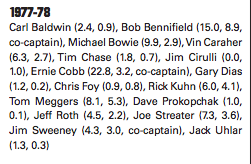
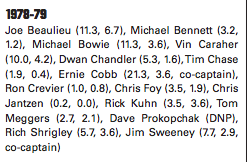
College Basketball Reference paints a similar picture. Streater played 11 games in the 77-78 season (which corresponds to news clippings we’ve found touting his play as a freshman), but it seems at some point during the season he stopped playing and never resurfaced on the team again. He’s not even listed by Boston College among official letterwinners for the program.
Below is a look at Streater’s stats from his freshmen year (77-78) followed by the next season in which the point shaving took place (78-79) in which he was gone.
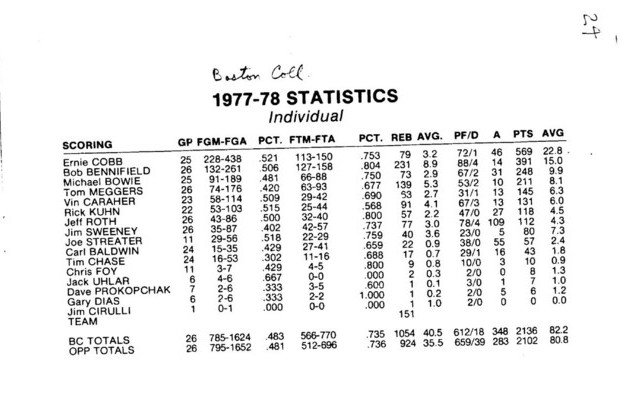 78-79 season in which the point shaving scandal took place.
78-79 season in which the point shaving scandal took place.
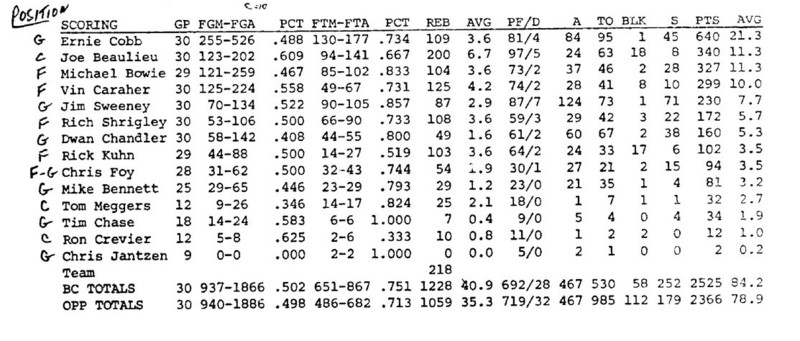 It’s hard to find a shred of Streater’s existence beyond his brief success at Boston College. Even Boston College’s Athletic Department couldn’t provide any info on Streater’s departure or why his name is found to be tied to the scandal when asked by Awful Announcing:
It’s hard to find a shred of Streater’s existence beyond his brief success at Boston College. Even Boston College’s Athletic Department couldn’t provide any info on Streater’s departure or why his name is found to be tied to the scandal when asked by Awful Announcing:
“We have no information on something that supposedly happened 35 years ago. There’s no one on the BC Athletics staff who was even here at the time.”
Further Confirmation
Streater wasn’t mentioned in the 30 for 30 documentary, which seemed to signal that maybe he just wasn’t involved and all the articles and Wikipedia mentions were wrong. The famed SI article penned by Henry Hill which spilled the beans on the scandal didn’t mention him either.
“I paid three Boston College basketball players during the 1978-79 season to shave points–not to blow games–in nine games between Dec. 16, 1978 and March 1, 1979. The players were Rick Kuhn and Jim Sweeney, who were in it from the beginning, and Ernie Cobb“
BC’s student paper didn’t include Streater in a 1996 article on the scandal. A recent Boston Globe article and countless others also omit Streater entirely.
I contacted The Associated Press’s David Porter who wrote Fixed, How Goodfellas Bought Boston College Basketball for an explanation. Surely he’d have the answer. The idea that so many people had it wrong was eating at me, as was the reason why Joe Streater and those close to him hadn’t done anything about the blemish to his reputation.
Porter was similarly bemused at Streater’s name being attached to the scandal:
“I have seen the name over the years and am mystified as well.”
That was enough for me, but how did this all get started?
Looking For Patient Zero Of Streater’s Involvement
There is no mention of Streater that we can find as being involved the scandal before 2008. In May of 2007, a Wikipedia article had been created and can be found in its original incarnation here.
On August 12th, 2008 an anonymous Wikipedia user for all intents and purposes then rewrote history. We don’t know why or who, but on that day 43 characters were added to the page. The bulk of these edits were the addition of Streater’s name five times into the article. The changes to the article on that day can be found here. From that day in 2008 up until yesterday, Streater’s involvement was never challenged, or deleted. He was now part of the scandal.
The edits all follow this basic pattern:
Before: “Kuhn agreed to participate, and brought in his teammate Jim Sweeney”
After: “Kuhn agreed to participate, and brought in his teammate Jim Sweeney and Joe Streater”
Five times Streater’s name is added in this fashion with virtually nothing else being edited (although in one sentence the amount that changed hands changes from $500 to $2,000).
The Wikipedia user in question is only identified by the IP address they used to make the changes, 155.212.229.132, an IP address that tracks back to the Goodwill charity organization network in Massachusetts. A history of all of this user’s revisions can be found here and includes:
– Continuous changes to the BC scandal’s page, all of which was the deleting of information and references once the Streater info stuck.
– Typo corrections to Goodwill’s Wikipedia page.
– The deletion of new Cavs Coach David Blatt’s basketball playing history from his page. It should be noted that Joe Streater and David Blatt played in a very high profile game in high school.
It’s been nearly five years since this user has edited an article.
The Snowball Effect
With Joe Streater unaware or unable to correct history, the revised version takes root including:
– ESPN republishing an AP article citing Streater. Multiple outlets including Yahoo , KU Sports, and The Seattle Times would run this piece (original here).
– SI who published the original Henry Hill piece, fell victim with the image above.
– Bleacher Report’s slideshow on the Most Shocking College Basketball Scandals, which names Streater.
– Many newspapers and television stations who ran a syndicated slideshow naming Streater (WBS , AJC, Journal News, WHIO, Springfield Sun News, 97.1 The River, The Statesman, and WSCO among dozens of others).
– Countless blogs and fans sites including SB Nation’s BC site, The Pittsburgh Sports Report, and The Offshore Gaming Association among countless others.
– Even a presentation to student athletes on compliance involving gambling names him.
Joe Streater, who has mostly been a ghost since leaving BC, was now an infamous point shaver and all it took was an anonymous editing of a Wikipedia page.
What Became Of Joe Streater?
This section could be sufficiently told in a concise sentence such as “I have no idea” or “He fell off the face of earth.”
Why did Streater leave BC? Maybe academics or disciplinary reasons? He wasn’t that far from home so homesickness doesn’t seem likely nor does a lack of playing time as he was a key cog of that 77-78 team. The former BC player told me, “He had mad skills and smarts.”
Maybe a hardship at home? A legal issue perhaps? Injury? Whatever it was, it’s hard to trace now and currently we’re unable to find any mention of him outside of his brief career at BC that lasted 11 games.
What he did from there is a total mystery. He never seems to surface in the basketball world or anywhere else, which is a shame because he may have actually had a future professionally in basketball. Streater made a favorable impression his freshman year, but before it was done he was gone – only to reappear 30 years later connected to a scandal that he wasn’t a part of.
Who’s At Fault?
Obviously, the anonymous Wikipedia user who appears to have started this deserves blame for attaching Streater’s name to the point shaving that took place.
Beyond that, one thing that sticks out is the original Wikipedia page back in 2007 listed several great sources including Porter’s book, court documents, and coverage from the Globe that are pictured below.
Since 2008, the Wikipedia article has somewhat regressed in terms of sourcing and has this message at the very top now.
“This article does not cite any references or sources. Please help improve this article by adding citations to reliable sources. Unsourced material may be challenged and removed. (September 2008)“
While Wikipedia’s crowdsourced editing system did raise some flags about some of these edits as seen here, Streater’s name stayed attached to the scandal for over six years and would have likely persisted if not for the documentary’s airing and perhaps some of my outreach on the matter.
From there, you can point blame at a lot of institutions. Google for featuring Wikipedia so highly in search results regardless of an individual article’s strength, the AP for not doing their own research in writing a story that would be widely syndicated, and SI who piggybacked off of Wikipedia rather than their own explosive cover story.
As far as motives go, it’s hard to say with total certainty at first glance how this started and why it persisted so long.
Solving The Unsolved
Who exactly started this snowball effect and why?
Why did Joe Streater leave BC and what has he done since?
How come Streater or people close to him never contested his involvement? Were they unmotivated, unaware, or unsure?
We’d love to get to the bottom of this and hope you’ll help us out so please contact us if you have any information.
An Ominous Sign Of Things To Come?
I love Wikipedia. I read it all the time. So it was a bit deflating to step behind the normal reading experience and see how the sausage is made. I’ve always used it as a baseline of knowledge for a topic and then if inclined, would drill-down to better sources to fill in any holes, gaps, questions, or curiosities I had.
We’re all guilty of relying on Wikipedia too much but that said, how many of us produce content and proliferate whatever inaccuracies exist there to a larger audience?
As journalism and original reporting continues to decline and our reliance on Wikipedia continues to grow, you begin to wonder how expansive of an issue this may become. I actually worked for a year and a half with the new head of Wikipedia, Lila Tretikov, at a software company around the same time that Streater’s name became tied to this mess. I wonder if she knows in her new role the full scope of the responsibility Wikipedia has as the web’s research tool of record in this new age.
I wonder if Wikipedia’s reliance on donations as a non-profit opposed to advertising hurts or helps their stewardship of our collective knowledge-base. More importantly, I worry about the future of original reporting when it’s become increasingly clear that doing a search is much easier and cheaper than picking up the phone or writing an email. If those in media accept the explanation “it’s Wikipedia’s fault,” we’re ignoring the fact you get what you pay for and just like the players at BC, you can either go along for the ride and hope for the best or resolve to hold yourself to higher standards.

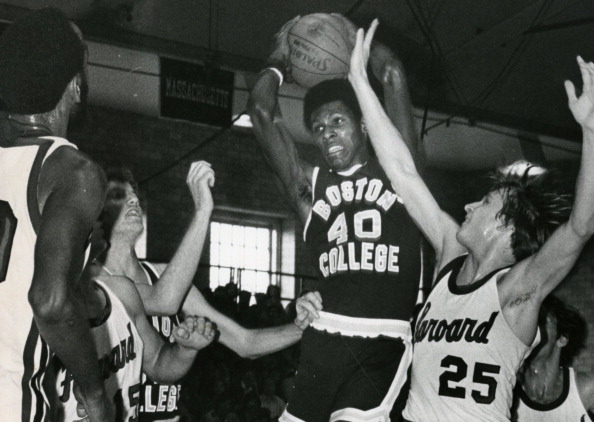
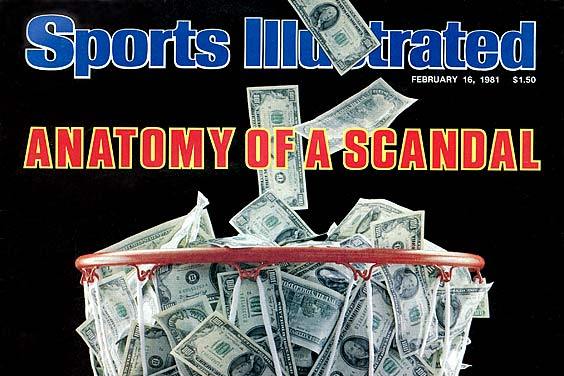
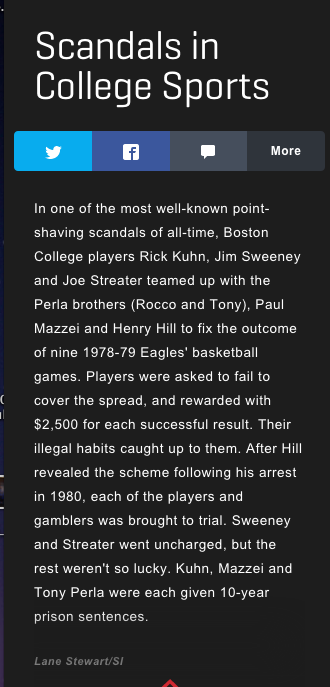







Comments are closed.